Unit1Where is your pen pal from
英语教学课件-七年级英语下Unit1_Where_is_your_pen_pal_from
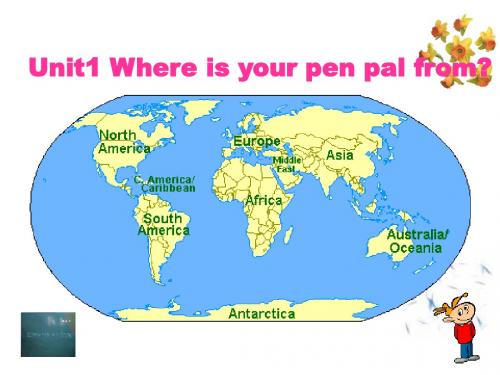
France Canada Japan
2c
Unit 1 Where’s your pen pal from?
Listen again and complete the chart.
Name
City
Country
John Jodie
Tokyo Paris
Japan France
Andrew Sydney Australia
the United Kingdom
London
Where is your pen pal from? He’s/She’s from… Where does he/she live? He/she lives in …
France
Paris
Where is your pen pal from? He’s/She’s from… does he/she live? He/she lives in … Where
Make a survey
Classmate
Chen Wei
Pen pal
Country
City
Language
Jodie France Paris French
Report: Chen Wei’s pen pal Jodie is from France. She lives in Paris . She speaks French.
Tokyo
pen
Where is your pen pal from? He’s/She’s from… Where does he/she live? He/she lives in …
the United States
New York
(word完整版)人教版英语七年级下学期1-12单元句子翻译专练及答案
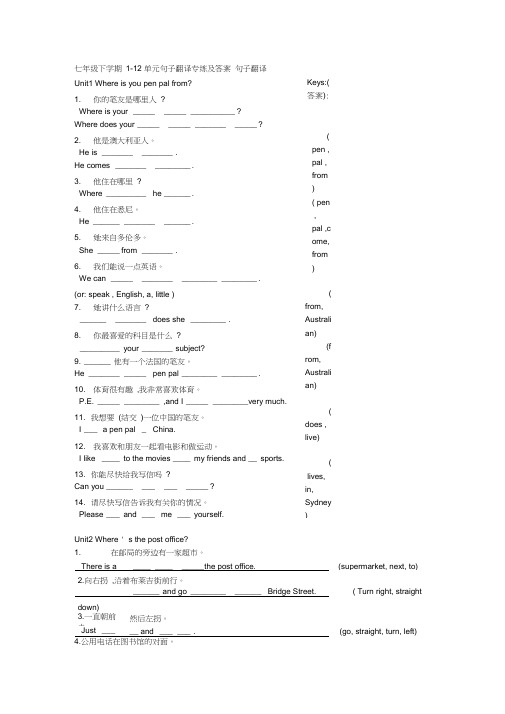
七年级下学期1-12 单元句子翻译专练及答案句子翻译Unit1 Where is you pen pal from?1. 你的笔友是哪里人?Where is your _____ _____ __________ ?Where does your _____ _____ _______ _____ ?2. 他是澳大利亚人。
He is _______ _______ .He comes _______ ________ .3. 他住在哪里?Where _________ he ______ .4. 他住在悉尼。
He ______ _______ ______ .5. 她来自多伦多。
She _____ from _______ .6. 我们能说一点英语。
We can _____ _______ ________ ________ .(or: speak , English, a, little )7. 她讲什么语言?______ _______ does she ________ .8. 你最喜爱的科目是什么?_________ your _______ subject?9. ______ 他有一个法国的笔友。
He _______ _____ pen pal ________ ________ .10. 体育很有趣,我非常喜欢体育。
P.E. _____ ________ ,and I _____ ________ v ery much.11. 我想要(结交)一位中国的笔友。
I ___ a pen pal _ China.12. 我喜欢和朋友一起看电影和做运动。
I like ____ to the movies ____ my friends and __ sports.13. 你能尽快给我写信吗?Can you ______ ___ ___ _____ ?14. 请尽快写信告诉我有关你的情况。
Please ___ and ___ me ___ yourself.Unit2 Where ' s the post office?1. 在邮局的旁边有一家超市。
unit 1 where is your pen pal from 教案
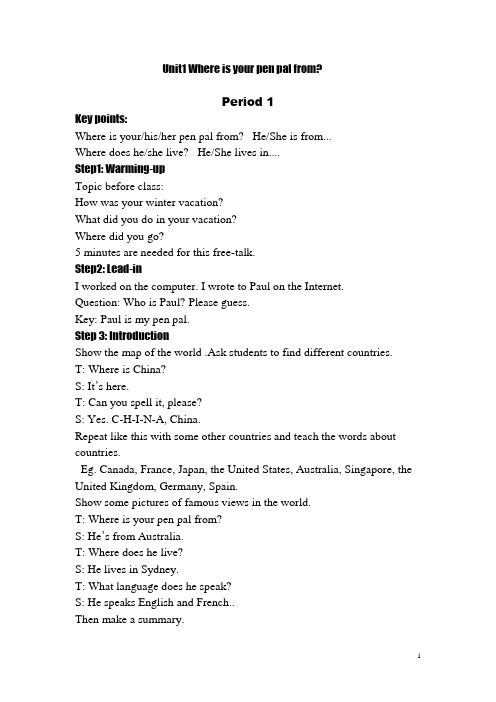
Unit1 Where is your pen pal from?Period 1Key points:Where is your/his/her pen pal from? He/She is from...Where does he/she live? He/She lives in....Step1: Warming-upTopic before class:How was your winter vacation?What did you do in your vacation?Where did you go?5 minutes are needed for this free-talk.Step2: Lead-inI worked on the computer. I wrote to Paul on the Internet. Question: Who is Paul? Please guess.Key: Paul is my pen pal.Step 3: IntroductionShow the map of the world .Ask students to find different countries. T: Where is China?S: It’s here.T: Can you spell it, please?S: Yes. C-H-I-N-A, China.Repeat like this with some other countries and teach the words about countries.Eg. Canada, France, Japan, the United States, Australia, Singapore, the United Kingdom, Germany, Spain.Show some pictures of famous views in the world.T: Where is your pen pal from?S: He’s from Australia.T: Where does he live?S: He lives in Sydney.T: What language does he speak?S: He speaks English and French..Then make a summary.Step 4: DrillsSentence Patterns:Where is … from?…is from….=Where do/does…come from?…come/comes from….Where’s your pen pal from?He’s from China.Where’s your pen pal from?He’s from Australia.Where’s your pen pal from?He’s from France.Where’s your pen pal from?He’s from the UK.Where’s your pen pal from?He’s from the USA.Where’re your pen pals from?They’re from Canada.Language points:1. pal n.朋友,好友;pen pal 笔友1)周末他想去见他的朋友。
新目标英语七年级(下)1-12单元必背句子与短语

七下1—6单元必背句子与词组Unit1 Where’s your pen pal from? (ok)1. --你的笔友来自哪里? -- Where is your pen pal from? (无―实义动词come, 用is/are‖) --他来自加拿大。
-- He/She is from Canada.同义句:-- Where does your pen pal come from? (有―实义动词come, 用do/does‖) -- He/She comes from Canada.来自:be from = come from练:They’re _______ Australia, a beautiful country.A. come fromB. comes fromC. fromD. for2. --你的笔友来自加拿大吗?-- Is your pen pal from Canada? (用法同上)--是的。
-- Yes, he/she is.同义句:-- Does your pen pal come from Canada? (用法同上) -- Yes, he/she does.3. 他来自澳大利亚:He is from Australia. 他是澳大利亚人:He is Australian.4. --你的笔友住在哪里?-- Where does your pen pal live?--他住在多伦多。
-- He/She lives in Toronto.居住在某地:live in sp练:-- When _____ the girl _____ her homework? -- In the evening.A. does, doesB. does, doC. is, doD. is, does-- _______ your sister have a pen pal? Yes, she _______.A. Is, isB. Does, doC. Can, canD. Does, does-- Ling Tao is a Chinese, but now he _______ in the UK.A. liveB. isC. is fromD. comes from5. --你的笔友说什么语言?-- What language does your pen pal speak?--他说英语。
初中英语人教版七年级下册《Unit 1 Where’s your pen palfrom》课件PPT

1. Take a walk through the park on Center Avenue. 2. Next to the hotle is a small house with an interesting garden. 2. This is the beginning of the garden tour. 3. Bridge Street is a good place to have fun. 4. I know you are arriving next Sunday. 5. Let me tell you the way to my house. 去……的路 6. You pass a bank on your right and then go down Long Street. 7. I hope you have a good trip.
参考文章:Unit 1 Section B Activity 3b
Unit 2 Where’s the psot office?
1.-- It’s across from the bank. -- It’s next to the post office. -- It’s between the bank and hospitle. -- It’s behind the supermarket. -- It’s in front of the School.
Unit 1 Where’s your pen pal from?
人教版初中英语七年级下册课件
复习巩固
目
新知导入
录
教学重点
拓展练习
PART 01
复习巩固
1.– Where’s your pen pal from? -- He’s from Australia. -- Where does your pen pal come from? -- He comes from Australia.
unit-1-where-is-your-pen-pal-fromsection-a-period-
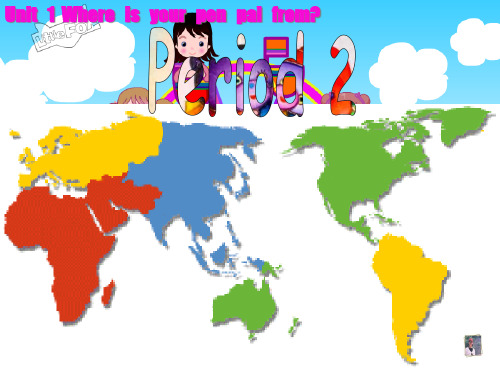
next
Show your pen pal.
Yao Ming is my pen pal. He is from China. He lives in the United States now.
1-1
Celine Dion is my pen pal. She is from Canada. She lives in Toronto.
B:He lives in New York. A:What language does he speak?
B:He speaks English.
Americans speak English.
A:…? B:... A:…? B:... A:What language does she speak? B:She speaks English and Chinese. Singaporeans speak English and Chinese.
Thank you !
B:He lives in Beijing.
A:What language does he speak? B:He speaks Chinese. Chinese speak Chinese.
A:Where is she from? B:She ... A:Where does she live? B:She ... A:What language does she speak? B:She speaks Japanese. Japanese speak Japanese.
A-do is__f_r_o_m__ _S_i_n_g_a_p_o_r_e__.
He is SingapoБайду номын сангаасean. He _s_p_e_a_k_s__ English and __C_h_i_n_e_s_e___. Zidane is from __F_r_a_n_c_e__. He is __F_r_e_n_c_h__. He speaks ___F_r_e_n_c_h__. Thorpe a__n_d_h_i_s_g_i_rl_f_r_ie_n_d_ are from_A_u_s_t_ra_l_ia_. They are Australian. They _s_p_e_a_k_ _E__n_g_li_s_h_.
Unit 1 Where is your pen pal from教案

Unit 1 Where is your pen pal from?教材分析:本单元是本册教材的第一单元,标题“Where is your pen pal from?”,主要围绕谈论国家以及主要城市和语言来展开各项教学活动。
该话题与学生的学习生活紧密联系,容易唤起学生的学习兴趣。
本单元的语法重点是一般现在时态和where引导的特殊疑问句,对此学生并部陌生,对这个时态的进一步学习和深化,为今后其他时态的学习奠定基础。
教学方法:本单元的教学除了沿用传统的讲授法、演示法、问答法和练习法之外,还引入了任务型教学。
任务型教学法,让学生带着任务去学习,将复杂的学习过程分解为一个个相对简单的小任务,方便学生明确学习目标、降低学习难度、提高学习效率。
使用的教学手段主要是多媒体课件,不仅可以是抽象的知识点得到直观展示,便于学生理解和掌握,同时也可以激发学习兴趣,保证课堂教学效果。
Teaching aims:1.Learn to talk about countries and cities.2.Ask and answer where the people live.3.Know about the world, the countries and custom in differentareas.Key points:1.Vocabularies: pen pal, live, the words of countries andcities.2.Sentences: Where is your pen pal from?She/He is from…Where does she/he live?She/He lives…Difficult points:1.The words of countries and cities.2.How to ask and answer the people where they are from,where they live.Teaching procedures:Step 1 Greet&Lead inFriend is very important in our daily life. How to make friends with foreigners by writing.Step 2 Learn by themselvesLearn page 1 and page 2 by themselves, find the countries and main cities. Look for the flags and main characters about these countries. If they want to know more, they can ask me. Step 3 Check what they learn1.Write these countries and cities. Introduce what theyknow to other students. The teacher add moreinformation.the United Kingdom, the United States, France, Japan, Australia, Canada, Tokyo, Sydney, Paris, Toronto, New York2.Answer these questions(1)Where are you from?(2)Where do you live?Step 4 New lesson1.Show some pictures, they are maps and cities aboutcountries. Help students remember the words andknow about the culture and custom.2.Listen and repeat the countries in 1a.Listen and circle the countries in 1a.Check answers.3.Help the city find its country.(2a)4.Listen and circle the cities and countries in 2a.(2b)Listen and complete the chart. (2c)Check answers.Step 5 PairworkUse the information on page 1 and page 2 to practice the following conversation:Do you have a pen pal?Yes, I do.Where’s your pen pal from?She/he is from…Where does she/he live?She/he lives…Step 6 Summary &Homework1.Ask 2 students to summary what they learn in theclass.2.Make a conversation about his/her pen pal.教学反思:通过本节教学发现:大部分学生能掌握教学目标中所要求的单词和句型,会读会用。
七年级英语下册复习资料
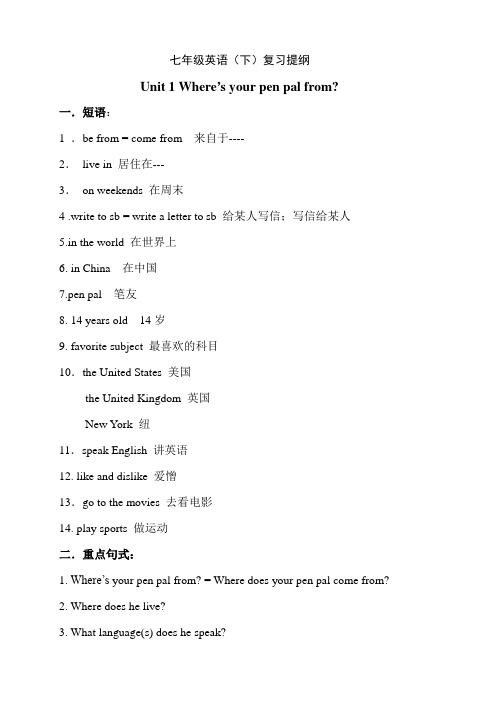
七年级英语(下)复习提纲Unit 1 Where’s your pen pal from?一.短语:1 .be from = come from 来自于----2.live in 居住在---3.on weekends 在周末4 .write to sb = write a letter to sb 给某人写信;写信给某人5.in the world 在世界上6. in China 在中国7.pen pal 笔友8. 14 years old 14岁9. favorite subject 最喜欢的科目10.the United States 美国the United Kingdom 英国New York 纽11.speak English 讲英语12. like and dislike 爱憎13.go to the movies 去看电影14. play sports 做运动二.重点句式:1. Where’s your pen pal from? = Where does your pen pal come from?2. Where does he live?3. What language(s) does he speak?4. I want a pen pal in China.5. I can speak English and a little French.6. Please write and tell me about yourself.7. Can you write to me soon?8. I like going to the movies with my friends and playing sports.三.本单元的国家,人民、语言对应1. Canada---- Canadian---- English / French2. France------ French------French3. Japan------Japanese----Japanese4. Australia----Australian----- English5 the United States------ American---- English6 the United Kingdom---British----- EnglishUnit 2 Where’s the post office?一.Asking ways: (问路)1.W here is (the nearest) ……?(最近的)……在哪里?2.C an you tell me the way to ……?你能告诉我去……的路吗?3.H ow can I get to ……?我怎样到达……呢?4.I s there ……near here / in the neighborhood? 附近有……吗?5.W hich is the way to ……?哪条是去……的路?二.Showing the ways: (指路)1. Go straight down / along this street. 沿着这条街一直走2. Turn left at the second turning. 在第二个路口向左转3. You will find it on your right. 你会在你右手边发现它4. It is about one hundred meters from here. 离这里大约一百米远5. You’d better take a bus. 你最好坐公交车去(You’d better+动词原形)三.词组1. across from ……在……的对面across from the bank 在银行的对面2. next to……紧靠……next to the supermarket 紧靠超市3. between……and……在……和……之间between the park and the zoo 在公园和动物园之间among 表示位于三者或三者以上之间4. in front of……在……前面There is a tree in front of the classroom. 课室前面有棵树in the front of……在……(内)的前部There is a desk in the front of the classroom.课室内的前部有张桌子5. behind……在……后面behind my house 在我家后面6. turn left/ right 向左/右拐on the left/right of……在某物的左/右边on the left of our school 在我们学校的左边on one’s left/right 在某人的左/右边on my left在我左边7. go straight 一直走8. down /along……沿着……(街道down/along Center Street 沿着中央街9. in the neighborhood=near here 在附近10 welcome to……欢迎来到……11. take /have a walk 散步12. the beginning of…………的开始,前端at the beginning of……在……的开始,前端in the beginning 起初,一开始13. have fun=have a good time=enjoy oneself 玩得开心,过得愉快我昨天玩得很开心I had fun yesterday.I had a good time yesterday.I enjoyed myself yesterday.14. have a good trip 旅途愉快15. take a taxi 坐出租车16. 到达:get to +地方get here/ there/ home 到这/那/家arrive in +大地方I arrive in Beijing.arrive at +小地方I arrive at the bank.reach +地方17.go across 从物体表面横过go across the street横过马路go through 从空间穿过go through the forest穿过树林18.on + 街道的名称Eg: on Center Streetat + 具体门牌号+街道的名称Eg: at 6 Center Street三.重难点解析1.enjoy doing sth 享受做某事的乐趣,喜爱做某事I enjoy reading. 我喜爱读书到目前为止,我们学了两个特殊的动词finish和enjoy,都是要带doing.I finish cleaning the room. 我扫完了这间屋子2.hope to do sth 希望做某事I hope to pass this exam. 我希望通过这次考试hope +从句I hope tomorrow will be fine. 我希望明天将会晴朗(从句即是一个小句子,这个小句子又放在大句子中,从属于大句子,所以叫从句如tomorrow will be fine是一个从句,它又放在I hope 的后面,形成句中有句)3. if 引导一个表示假设的句子If I have much money, I will go to the moon.如果我有许多钱,我就会去月球If you are hungry, you can buy some food in the supermarket.如果你饿了的话,你可以在超市买一些食物四.本单元的反义词、近义词配对1、new—old2、quiet--- busy 3 、dirty--- clean 4 、big---- smallUnit 3 Why do you like koala bears?一.重点词组eat grass eat leaves be quiet very shy very smart very cute play with her friends kind of South Africa other animals at night in the day every day during the day二. 交际用语1.Why do you like pandas?Because they’re very clever.2.Why does he like koalas?Because they’re kind of interesting.3.Where are lions from?They are from South Africa.4.What other animals do you like?I like dogs, too. Why?Because they’re friendly and clever.5.Molly likes to play with her friends and eat grass.6.She’s very shy.7. He is from Australia.8.He sleeps during the day, but at night he gets up and eats leaves. 9.He usually sleeps and relaxes 20 hours every day.10.Let’s see the pandas first.11.They’re kind of interesting.12.What other animals do you like?13.Why do you want to see the lions?三. 重点难点释义1、kind of 有点,稍微Koala bears are kind of shy. 考拉有点害羞kind 还有“种类”的意思如:各种各样的all kinds ofWe have all kinds of beautiful flowers in our school.2、China n. 中国Africa n.非洲China 和Africa都是专有名词,首字母都应该大写,而且和介词in连用There are many kinds of tigers in China.There are many kinds of scary animals in Africa.3、friendly adj.友好的,和蔼可亲的它是名词friend的形容词形式,常常和be动词连用, be friendlyThe people in Chengdu are very friendly to others.4、with prep. 跟,同,和…在一起I usually play chess with my father.注意区别与and的用法,and通常用于连接主语或宾语,连接主语时,如果有I, I通常放在and 之后,如:My father and I usually play chess together.Play with “和…一起玩耍”“玩…”I often play with my pet dog. Don’t play with water!5、day和night 是一对反义词,day 表示白天或一天,night表示夜或夜晚通常说in the day, during the day, at nightKoala bears often sleep during the day and eat leaves at night.6、leaf n. 叶子复数形式为:leaves, 类似的变化还有:wife—wives, wolf—wolves,knife—knives,scarf---scarfs (scarves)等7、hour n. 小时;点钟hour前边通常加上冠词an 表示“一个小时”,即:an hourThere are 24 hours in a day and 60minutes in an hour.8、be from 来自… Be from = come fromPandas are from China. = Pandas come form China.9、meat n. (食用的)肉,为不可数名词,表示“许多”时,使用much来修饰,即:much meat He eats much meat everyday.10、grass n.草,为不可数名词,表示“许多”时,使用much来修饰,即:much grassThere is much grass on the playground.四. 语法知识特殊疑问句通常以“what”、“who”、“which”、“when”、“where”、“how”、“how old”、“how many”等开头,对某一具体问题进行提问特殊疑问句的基本构成有两种情况:1. 疑问句+一般疑问句结构这是最常见的情况例如:What’s your grandfather’s telephone number?你爷爷的电话号码是多少?Who is that boy with big eyes? 那个大眼睛的男孩是谁?Which season do you like best? 你最喜欢哪个季节?When is he going to play the piano? 他什么时候弹钢琴?Where does he live? 他住在哪儿?How are you?你好吗?How old are you? 你多大了?How many brothers and sisters do you have? 你有几个兄弟姐妹?2. 疑问句+陈述句结构这时疑问词作主语或修饰主语例如:Who is on duty today? 今天谁值日?Which man is your teacher? 哪位男士是你的老师?我们学过的What/How about+名词/代词+其他?也是特殊疑问句,它是一种省略结构例如:I like English. What/How about you?我喜欢英语你呢?What about playing basketball?打篮球怎么样?Unit 4 I want to be an actor.一.短语:1 want to do sth 想要作某事2 give sb sth = give sth to sb 给某人某物/ 把某物给某人3 help sb do sth 帮助某人作某事Eg: I want to help my mother do some housework at home.4 help sb with sth 帮助某人谋事Eg: I want to help my mother with some housework at home5 in the day 在白天6 at night 在晚上7 talk with/ to sb 和----谈话8 be busy doing sth 忙于做某事Eg: He is busy listening to the teacher.9 in a hospital 在医院10 work/ study hard 努力工11 Evening Newspaper 晚报二.重点句式及注意事项:1 询问职业的特殊疑问词是what;有三种主要句式①What + is / are + sb? Eg. What is your mother?②What + does/ do + sb + do? Eg. What does his brother do?③What + is/ are + 名词所有格/ 形容词性物主代词+ job? Eg . what is your job?2 People give me their money or get their money from me.3 Sometimes I work in the day and sometimes at night.4 I like talking to people.5 I work late. I’m very busy when people go out to dinners.6 Where does your sister work?7 then we have a job for you as a waiter.8 Do you want to work for a magazine? Then come and work for us as a reporter.9 Do you like to work evenings and weekends?10 We are an international school for children of 5-12.三.本单元中的名词复数1 policeman--policemen2 woman doctor--women doctors3 thief--thieves 4.apple tree--apple treesUnit 5 I’m watching TV一.现在进行时Ⅰ现在进行时的用法表示现在(说话瞬间)正在进行或发生的动作Ⅱ现在进行时时间状语及标志性词○1now 现在○2at the momen t现在○3look 看(后面有明显的“!”)○4listen 听(后面有明显的“!”)Ⅲ现在分词的构成①一般在动词结尾处加ing Eg: go—going look--looking②以不发音字母e结尾的动词,去e加ing Eg:write—writing close--closing③以重读闭音节结尾的动词,如果末尾只有一个辅音字母,应先双写这个字母,再加ing.Eg: get—getting run—running ( swim, run, put,get,sit,begin)Ⅳ现在进行时的构成肯定句: 主语+ am/is/are+ doing +其他+时状. Eg: He is doing hishomework now.否定句:主语+am/is/are +not+ doing+其他+时状. Eg: He is not doing his homework now.一般疑问句:Am/Is/Are +主语+ doing+其他+时状?Eg: Is he doing his homework now?肯定回答:Yes,主语+am/is/are Eg Yes, he is.否定回答:No, 主语+am not/isn’t/aren’t Eg: No, he isn’t. 二.短语:1.do one’s homework 做某人的作业do housework 做家务2.talk on the phone 在电话里交谈,talk about……谈论……talk to(with)sb 和某人交谈3.write a letter 写信write a letter to sb 给某人写信4.play with……和……一起玩5.watch TV看电视TV show 电视节目6.wait for sb/sth 等待某人/某物7.some of…………中的一些8.in the first photo 在第一张照片里(介词用in,序数词前面有the)in the last photo 在最后一张照片里 a photo of one’s family 某人的家庭照片9.at the mall 在购物街at/in the library 在图书室at/in the pool 在游泳池10.read a book = read books = do some reading看书\阅读11.thanks for = thank you for为某事而感谢(后接动词要用v-ing)三.重点句式及注意事项:1.他正在干什么?What is he doing? 他正在吃饭He is eating dinner.他正在哪里吃饭?Where is he eating dinner他正在家里吃饭He is eating dinner at home.2.你想什么时候去?When do you want to go? 让我们六点钟去吧Let’s go at six o’clock.3.他正在等什么?What is he waiting for? 他正在等公交车He is waiting for a bus.4.他们正在和谁说话?Who are they talking with?他们正在和Miss Wu说话They are talking with Miss Wu.5.你们正在谈论什么?What are you talking about?我们正在谈论天气We are talking about the weather.6.他们都正在去上学They are all going to school.7.这儿是一些我的照片Here are some of my photos.这儿是一些肉Here is some of meat.(some of meat不可数,故用is)8.谢谢你帮我买这本书Thank you for helping me buy this book. 9.family 家;家庭强调“整体”,是单数;强调“成员”时,是复数His family has a shower. 他们家有一个淋浴His family are watching TV. 他全家在看电视Unit 6 It’s raining!一.短语:1 take photos/ pictures照像2 take photos/ pictures of sb/ sth给某人或某物照相3 have a good time\have fun\have a great tame 玩得愉快4 work for sb / sth为某人工作Eg: Yuan Yuan works for CCTV’s Around The World show5 on vacation度假Eg: There are many people here on vacation.6 some…others…一些…另外一些…one…the others…一个…另一个…(两者之间)Eg: There are many students in the classroom. Some are writing, others are reading.7 put on 穿上(动作)wear 穿着(状态)Eg: Tom is putting on his coat now.8 on the beach在沙滩上Eg: Tom and his family are playing on the beach at this moment.9 this group of people这一群人10. in this heat 二.重点句型1.How is the weather? 天气怎么样?In the raining. 在下雨2.What are you doing? 你正在做什么?I'm watching TV. 我在看电视3.What are they doing? 他们在做什么?They are studying. 他们在学习4.What is he doing? 他在做什么?He is playing basketball . 他在打篮球5.What is she doing ? 她在做什么?She is cooking . 她在做饭三.重难点解析1、询问天气情况的句式:(横线内容可替换)①How is the weather in Beijing? (How is the weather today?)②What’s the weather like in Beijing? ( What’s the weather like today?)2、回答上面问题的句式:①It’s + adj. (形容词) Eg: It’s windy.3 、How’s it going (with you)?①Not bad. ②Great! ③Terrible!④Pretty good.4、Thank you for joining CCTV’s Around The Word show.5、I am surprised they can play in this heat.6、Everyone is having a good time.7、People are wear ing hats and scarfs.①wear 指穿衣服的状态②put on 指穿衣服的动作Please put on your old clothes四.谈论天气的日常用语1. It’s sunny/rainy/cloudy. 今天是晴天/雨天/阴天2. Lovely weather,isn’t it? 天气真好,是吗?3. It looks like rain. 看起来要下雨4. It’s raining cats and dogs. 正是瓢泼大雨5. It seems to be cleaning up. 天似乎要转晴6. It’s blowing hard. 风刮得很大7. It’s snowing heavily. 正在下大雪8. The snow won’t last long. 雪不会持续太久9. It’s very fogg y. 雾很大10. The fog is beginning to lift. 正在收雾11. It’s thundering and lightening. 雷电交加12. What’s the weather like today? 今天天气怎么样?13. What’s the weather report for tomorrow? 天气预报明天怎么样?14. It’s quite different from the weather report. 这和天气预报相差很大15. It’s rather changeable. 天气变化无常16. What’s the temperature? 温度是多少?17. It’s two below zero. 零下二度18. The temperature has dropped a lot today. 今天温度低多了Unit7 What does he look like?一.短语1. look like 看起来像....2. curly /short/straight/long hair 卷/短/直发3. medium height/build 中等高度/身体4. a little bit 一点儿…5. a pop singer 一位流行歌手 6 .have a new look 呈现新面貌7. go shopping (do some shopping) 去购物8. the captain of the basketball team篮球队队长9. be popular with sb 为---所喜爱10. one of --- ---中的一个11 .stop to do sth 停下来去做某事12. stop doing sth 停止正在做的事情13 .tell jokes/ stories 讲笑话/ 讲故事14. have fun doing sth 愉快地做某事15. remember ( forget) to do sth 记得(忘记)做某事(没有做的)16 . remember (forget) doing sth 记得(忘记)做过某事(已做)二.本单元的重点句:1.Is that your friend? No, it isn’t.2. What does she look like?3. I think I know her. ( I don’t think I know her.)4. Wang Lin is the captain of the basketball team.5. She’s a little bit quiet. 6 .Xu Qian loves to tell jokes.7 .She never stops talking. 8 .She likes reading and playing chess.9. I don’t think he’s so great. 10. I can go shopping and nobody knows me.11. Now he has a new look.三.重难点解析1. What does/ do +主语+ look like? 询问某人的外貌特征,看上去什么样?Eg: What does your friend look like?2. 形容头发时,可按照先长短,后曲直,最后说颜色的顺序说(长形色)Eg: She has long curly black hair.3. one of + 名词复数,谓语动词要用“单三”形式Eg: One of his friends is a worker.4. 不定代词做主语时,谓语动词要用“单三”形式修饰不定代词词,应该放在它的后面.Eg: I can go shopping and nobody knows me.5.He is …(通常为形容词,包括身高、体形等)He has…(通常为形容词修饰的名词,包括头发、五官)He wears…(穿、戴、留可以是衣服、帽子、鞋子等,也可以是眼镜、手表、胡须)6.I don’t think…的用法表达否定的看法I don’t think she is good-looking.(否定主观态度)Unit 8 I'd like some noodles一.短语1.beef and tomato noodles\noodles with beef and tomato 牛肉西红柿面chicken and cabbage noodles mutton and potato noodlestomato and egg noodles beef and carrot noodles 2.would like to do sth \want to do s.th 想要作某事3.what kind of noodles什么种类的面条4.what size bowl of noodles 什么大小碗型的面5.a large\medium\small bowl of noodles 大\中\小碗的面6.ice cream冰淇淋orange juice桔汁green tea绿茶RMB人民币phone number7.House of Dumplings\noodles饺子\面馆Dessert House甜点屋二.重点句型1.What kind of vegetables\meat\ drink food would you like?I’d like ……I’d like chicken and cabbage noodles.2.What kind of noodles would you like? I’d like beef noodles.3.What kind of noodles would you like? I’d like chicken and cabbage noodles.4.What size bowl \plate of noodles would you like?5.I’d like a large \ medium\small bowl noodles.6. What size cake would you like? I would like a small birthday-cake.三.重难点解析1.would like 想要(表示一种委婉的语气)其用法相当于want.would like + 名词would like an apple (want an apple)would like to do sth He would like to play soccer.----Would you like to see the dolphins? ----Yes, I’d like to. (1)would 是情态动词,没有人称和数的变化,可与人称代词缩写为’d, 与其它情态动词一样可帮助完成疑问句和否定句(你能举出例子吗?)我想要些牛肉I’d like some beef.她想去打乒乓球She would like to play ping-pang. (你能变否定句和疑问句吗?)(2) Would you like sth.? 是提建议的一种句型,如需用一些,用some而不用any.肯定回答是:Yes, please./ All right./ Yes./OK. 其否定回答是:No, thanks.2.What kind of noodles would you like?kind 在此句中作“种类”讲,a kind of 一种,all kinds of 各种各样的kind of 有几分A cat is a kind of animal. There are all kinds of animals in the zoo The cat is kind of smart.3.Can I help you?你要买什么? 肯定Yes, please . I would like ……否定No, thanks.Unit 9 How was your weekend一.短语1. play +运动play soccer play tennis play sportsplay the + 乐器play the guitar play with…和某人\物玩耍2.have +三餐have breakferst \lunch \ supper3. study for…clean the room visit sb stay at homehave a party talk show4.go to the beach go to the movies go for a walk go to the mountains5.go shopping\do some shopping \go to the shop 买东西6.last weekend\over the weekend 上周末on weekends 每周末7.on +某日+morning\afternoon\evening (或具体的某一天) in + morning\afternoon\eveningin+世纪\年\月\季节at +时刻last (next) month\year\week8.what about+n\v-ing\pren=how about ……呢9. spend the weekend last week 度过上周的周末10.it’s time to do sth=it’s time for sth 该做么的时候了11.look for寻找.....二,重点句型和语法1.一般过去时表示过去发生的动作或存在的状态,通常与过去的时间状语连用:yesterday ,last week(month,year)(1)系动词be的过去时: am(is) →was, are →were陈述句:He was at home yesterday.否定句:He wasn’t at home yesterday.疑问句:Was he at home yesterday? Yes ,he was./No ,he wasn’t.(2)行为动词的一般过去时:陈述句:主语+动词过去式+其它I go to the movie. →I went to the movie.否定句:主语+助动词didn’t+动词原形+其I don’t go to school today. →I didn’t go to school.一般疑问句:Did +主语+动词原形+其它Do you have breakfast? →Did you have breakfast?Yes,I do./No,I don’t. Yes,I did./No,I didn’t.(3)规则动词的过去式变化规则动词不规则变化:do →did have →had go →went see →saw read →read get →gotgive →gave sleep →slept eat →ate write →wrote find_---found2.what’s the date today? It’s …3.What was the date yesterday? It was…What’s the weather like today? It’s …?4.How was your weekend?6.What did she do ?She did her homework7.What did he do last weekend ?He played soccer8..It’s time to go home= It’s time for homeUnit 10 Where did you go on vacation?一.短语1.go on vacation go to summer camp stay athomestudy for exams Central Park show sth to sb.help him find his father walk back to…go shoppingthe Palace Museum think of have fun doing sth.bus trip the Great Wall Tian’an Men Square.a Beijing Hutong make sb do sth.decide to do sth all day二.重点句子和注意事项1.Where did you go on vacation? I went to summer camp.Where did they go on vacation? They went to New York City.Where did he go on vacation? He stayed at home.Where did she go on vacation? She visited her uncle.2.Did you/he/she/they go to Central Park?Yes, I/he/she/they did. No, I/he/she/they didn’t.3.How were the movies?They were fantastic4.have fun doing something干某事有乐趣=enjoy oneself doing somethingWe have fun learning and speaking English .We enjoy ourselves learning and speaking English . 我们学英语有很多乐趣.5.find sb. doing sth. 发现某人在干某事find sb. do sth. 发现某人干过某事I find him reading the novel (小说). I found him go into the room .6.corner角落,角,拐角处in the corner 在角落里(指在建筑物里面)at the corner 在拐角处(指在建筑物外面或道路的拐角)My bike is at the corner .7.be lost 迷路了=get lost , lost (adj.) The girl was lost in the big city .8.help sb. (to) do sth.=help sb for sth 帮助某人干某事He always helps us learn English9. make sb. do sth. 让/使某人干某事let / have sb. do sth. do前不带toThe movie makes me relaxing . Let the boy do his homework alone .10. feel+ adj. 感到...I feel hungry / tired /happy /excited11. decide to do sth. 决定干某事They decided to go toHainan on vacation .Uint 11 What do you think of game shows?一.词组1.. TV shows(电视节目)soap opera sitcom a comedy an action movie a documentary a thriller cartoon Beijing OperaAnimal World Tell it like it is Law Today game show CCTV News News in 30 Minutes Man and Nature nese Cooking Around China talk show Lucky52 rts news sports show Culture China2. write an article for the school magazine.给学校杂志写一篇文章3. a thirteen - year - old boy.一个十三岁的男孩4. wear colorful clothes.穿着颜色鲜艳的衣服5. interview sb. 采访某人 in fact. 实际上6. wear scarves. 戴着围巾7 .think of 想起,考虑到二.重点句型1. What do you think of soap operas? I can't stand them.2. What do you think of sports shows? I don't mind them.3. What does she think of "Hilltop High"? She doesn't like it.4. What does Tony think of Tommy? He likes him.5. What do they think of Amanda? They love her.三.重难点解析1. wear (v. 动词) "穿,戴,佩"根据不同宾语,翻译不同的汉语意思wear earrings 戴耳环 wear a dress 穿连衣裙wear a watch 戴手表wear a beard 蓄胡子wear long hair 留长发2. think "想,考虑,思索"(v. 动词)可以和许多介词搭配,组成新的意思A:think of "考虑";"有...的看法",有时等于think about.What does he think of Beijing Opera?他对京剧有什么看法?My mother always thinks of everything!我妈妈总是想到所有的东西think highly of sb. /sth. 对某人或某物评价甚高Mr Black thinks highly of his son. 布莱克先生对他儿子评价甚高B:think about "考虑"(指计划,观念,看它是否相宜、可行)He is thinking about going to China.他正在考虑去中国3. too与either的区别too"也",表示肯定意义,与肯定的表达方法连用;而either"也不",表示否定意义,与否定的表达方法连用(1)—My brother likes to play soccer.我哥哥喜欢踢足球—I do, too.我也是(喜欢)(2)—My brother doesn't like to play soccer.我哥哥不喜欢踢足球—I don't, either.我也不喜欢also也可以表示"也",但一般情况下,too和either放在句子之后,also放在动词之前We also love talk shows.我们也喜欢访谈节目4. a thirteen - year - old boy 一个十三岁的男孩此结构中,year用单数形式,且用连字符,这种结构用作定语a five - month - old baby 一个五个月大的婴儿5. enjoy (v. 喜爱,享受)enjoy后面接名词、代词或动名词,注意与like/ love用法的区别like/ love 还可以接动词不定式(to do)I enjoy the soap operas.我喜爱肥皂剧I enjoy watching the soap operas.我喜爱看肥皂剧但我们不能说:I enjoy to watch the soap operas.只能说:I like / love to watch the soap operas.6. mind 表示"介意,反对"的意思时,通常用在疑问句、否定句中Would you mind opening the window?请你打开窗子好不好?He doesn't mind the cold weather at all.他一点都不在乎寒冷的天气多用于以下句型:(表示请求或征求意见)后接动名词/名词/代词Would you mind (doing) ...? Do you mind (doing) ...?7. stand 表示忍受(多用于否定句、疑问句)He can't stand the hot weather.他忍受不了炎热的天气Can you stand the pain?你忍受得了疼吗?9. What do you think of ...? 你认为...怎么样?(谈论对某事物的喜好程度)可选择的回答有:(1)I like it. (2)I don't mind it.(3)I don't like it. (4)I can't stand it. (5)I like it very much.(6)I love it. (7)It's beautiful. (8)They're fantasticUnit 12 Don't eat in class.一.短语.1. in class 在课上2. on school nights 在上学的晚上3. school rules 校规4. no talking 禁止交谈5. listen to music 听音乐6. have to 不得不7. take my dog for a walk 带狗去散步8. eat outside 在外面吃饭9. in the hallway 在走廊上10. wear a uniform 穿制服11. arrive late for class 上学迟到12. after school 放学后17. be in bed 在床上13. practice the guitar 练习弹吉它14. in the cafeteria 在自助食堂里15. meet my friends 和我朋友见面16. by ten o'clock.十点之前18. the Children's Palace 少年宫19. help my mom make dinner 帮助我妈做饭二.重点句型1.Don’t arrive late for school=Don’t be late for school2.Don’t fight =3.Don’t listen to music in the classroom.4.Don’t run in the hallways5.Don’t smoke .It’s bad for your health.6.Don’t play cards in school7.Don’t talk in class 8.Don’t watch TV on school nights.9.Don’t sleep in class. 10.Don’t play sports in the classrooms.11.Don’t sing songs at night. 12.Don’t talk when you eat.13.Don’t wear hats in class. 14.Do homework by 10:00.15.Clean your house! 16.Make the bed.17.Can we ……? Yes ,we can . No, we can’t.Eg:Can we arrive late for class ? No, we can’t. We can’t arrive late for class.18.Do you have to wash your clothes? Yes, I do./No, I don’t.三.重难点解析:1. 情态动词have to 的用法,意思是"必须、不得不",它侧重于客观上的必要和外界的权威(1)结构:主语+have to+动词原形+其他(一般现在时,主语是第三人称单数时,用has to;句子是过去时,用had to.)如:We have to wear sneakers for gym class. 在体育课上,我们必须穿运动鞋Tom has to practice the guitar every day. 汤姆每天必须练习弹吉它I had to get up at 5:00 am last Monday. 上周一,我不得不早上5点起床(2)否定形式:主语+don't have to+动词原形+其他(一般现在时,主语是第三人称单数时,用doesn't have to. 句子是过去时,用didn't have to)如:Nick doesn't have to wear a uniform. 尼克不必穿制服We didn't have to do our homework at once. 我们不必马上完成作业(3)疑问句:Do (Does或Did)+主语+have to +动词原形+其他如:Do you have to stay at home on weekends? 周末你必须呆在家里吗?Yes, I do. / No, I don't.是的,我必须不,我不必Did he have to go to bed by 11:00 last night? 昨晚,他不得不11点前上床睡觉吗?2. 情态动词can的用法(1)表示能力,"会""能"(在第一册中已经学习这种用法)Can you play the guitar? 你会弹吉它吗?Judy can speak a little Chinese. 朱蒂会说一点中文I can dance and sing. 我能唱歌又能跳舞(2)表示允许、许可,"可以"、"能"(在这一课中新学的词义)Can the students run in the hallways? 学生们可以在走廊上跑吗?We can eat outside. 我们可以在外面吃东西Can I come in? 我能进来吗?注意同样是情态动词,can 和have to 的用法是有区别的,和大部分情态动词一样,can在否定句中,直接在can后加上not,在疑问句中,把can放到主语前面,并且没有人称和数的变化3. hear,listen和sound都有"听"的意思,但三者是有区别的(1)hear"听说",侧重于"听"的内容I'm sorry to hear that you are ill. 听说你生病了,我很难过I never heard such an interesting story. 我从来没听过这么有趣的一个故事(2)listen"听"侧重于"听"这一动作Listen to me carefully. 认真听我说The children like to listen to music. 孩子们喜欢听音乐(3)sound"听起来",它是系动词,后面接形容词等That sounds great. 那听起来真不错It sounds like fun. 听起来挺有趣4. be in bed "在床上、卧床"in 和bed之间不能用冠词,bed也不用复数He is in bed for 10 years. 他卧床10年了Dave has to be in bed early every night.大卫每晚必须很早睡觉5. arrive late for 与be late for 意思相近,"迟到"Don't arrive (be)late for school. 上学别迟到I arrived (was)late for the meeting yesterday. 我昨天开会迟到了6. No talking ! "禁止交谈!"no后面加上名词或动名词(doing)也表示不要做某事与don't +do的用法相似No wet umbrellas! / Don't put wet umbrellas here! 禁止放湿雨伞!No food! Don't eat food here! 禁止吃食物!No smoking! Don't smoke here! 禁止吸烟!7.语法(祈使句)祈使句是用来表示请求、命令、叮嘱、号召或者劝告等的句子,这类句子的主语常是第二人称you,也就是听话者,因而you常省去了祈使句的开头是动词原形如:Look out! 小心!Wait here for me! 在这等我!Be sure to come here on time! 务必准时来到这里!祈使句的否定形式多以do not(常缩写成don't)开头,再加上动词原形Don't arrive late for school. 上学别迟到Don't fight! 别打架!Don't look out of the window. 不要向窗外看。
人教版七年级下册英语Unit1
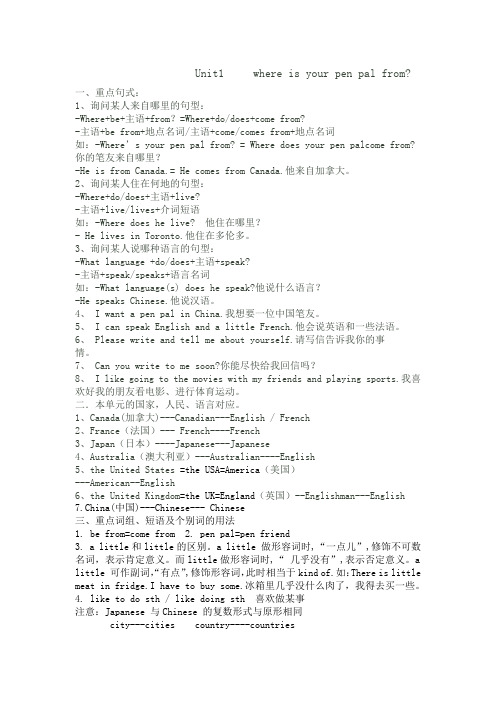
Unit1 where is your pen pal from?一、重点句式:1、询问某人来自哪里的句型:-Where+be+主语+from?=Where+do/does+come from?-主语+be from+地点名词/主语+come/comes from+地点名词如:-Where’s your pen pal from? = Where does your pen palcome from?你的笔友来自哪里?-He is from Canada.= He comes from Canada.他来自加拿大。
2、询问某人住在何地的句型:-Where+do/does+主语+live?-主语+live/lives+介词短语如:-Where does he live? 他住在哪里?- He lives in Toronto.他住在多伦多。
3、询问某人说哪种语言的句型:-What language +do/does+主语+speak?-主语+speak/speaks+语言名词如:-What language(s) does he speak?他说什么语言?-He speaks Chinese.他说汉语。
4、 I want a pen pal in China.我想要一位中国笔友。
5、 I can speak English and a little French.他会说英语和一些法语。
6、 Please write and tell me about yourself.请写信告诉我你的事情。
7、 Can you write to me soon?你能尽快给我回信吗?8、 I like going to the movies with my friends and playing sports.我喜欢好我的朋友看电影、进行体育运动。
二.本单元的国家,人民、语言对应。
1、Canada(加拿大)---Canadian---English / French2、France(法国)--- French----French3、Japan(日本)----Japanese---Japanese4、Australia(澳大利亚)---Australian----English5、the United States =the USA=America(美国)---American--English6、the United Kingdom=the UK=England(英国)--Englishman---English7.China(中国)---Chinese--- Chinese三、重点词组、短语及个别词的用法1. be from=come from2. pen pal=pen friend3. a little和little的区别。
七年级上册人教版英语课文
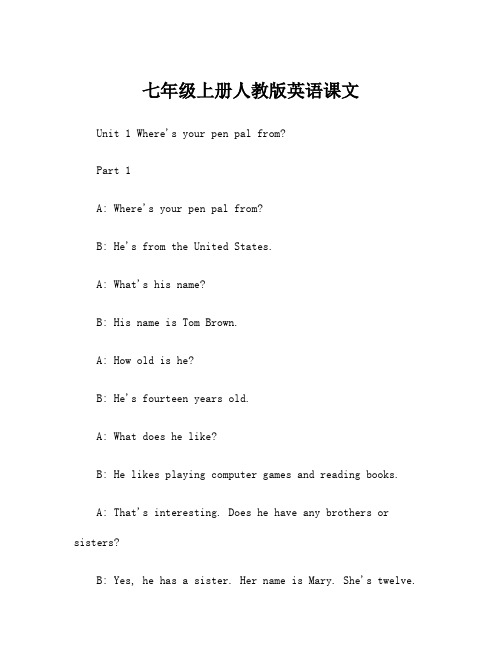
七年级上册人教版英语课文Unit 1 Where's your pen pal from?Part 1A: Where's your pen pal from?B: He's from the United States.A: What's his name?B: His name is Tom Brown.A: How old is he?B: He's fourteen years old.A: What does he like?B: He likes playing computer games and reading books.A: That's interesting. Does he have any brothers or sisters?B: Yes, he has a sister. Her name is Mary. She's twelve.Part 2A: Where's your pen pal from, Gina?B: He's from Australia.A: What's his name?B: His name is Sam Smith.A: How old is he?B: He's fifteen years old.A: What does he like?B: He likes playing soccer and listening to music. A: Does he have any brothers or sisters?B: No, he's the only child in his family.Part 3A: Excuse me, is this your postcard?B: No, it isn't. It's from my pen pal in Canada.A: What's his name?B: His name is Mike Green.A: How old is he?B: He's thirteen years old.A: What does he like?B: He likes playing the guitar and watching TV. A: Does he have any brothers or sisters?B: Yes, he has two brothers.。
七年级英语下册第一第二单元词汇用法汇总
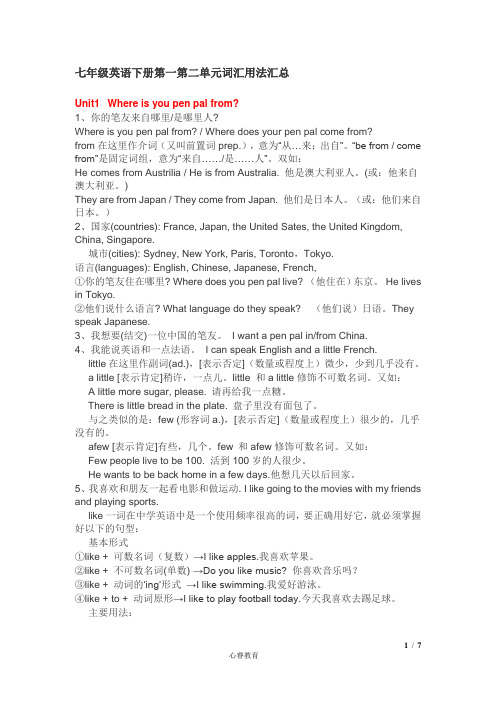
七年级英语下册第一第二单元词汇用法汇总Unit1 Where is you pen pal from?1、你的笔友来自哪里/是哪里人?Where is you pen pal from? / Where does your pen pal come from?from在这里作介词(又叫前置词prep.),意为―从…来;出自‖。
―be from / come from‖是固定词组,意为―来自……/是……人‖。
双如:He comes from Austrilia / He is from Australia. 他是澳大利亚人。
(或:他来自澳大利亚。
)They are from Japan / They come from Japan. 他们是日本人。
(或:他们来自日本。
)2、国家(countries): France, Japan, the United Sates, the United Kingdom, China, Singapore.城市(cities): Sydney, New York, Paris, Toronto,Tokyo.语言(languages): English, Chinese, Japanese, French,①你的笔友住在哪里? Where does you pen pal live? (他住在)东京。
He lives in Tokyo.②他们说什么语言? What language do they speak? (他们说)日语。
They speak Japanese.3、我想要(结交)一位中国的笔友。
I want a pen pal in/from China.4、我能说英语和一点法语。
I can speak English and a little French.little在这里作副词(ad.),[表示否定](数量或程度上)微少,少到几乎没有。
a little [表示肯定]稍许,一点儿。
Unit1 Where's your pen pal from知识点
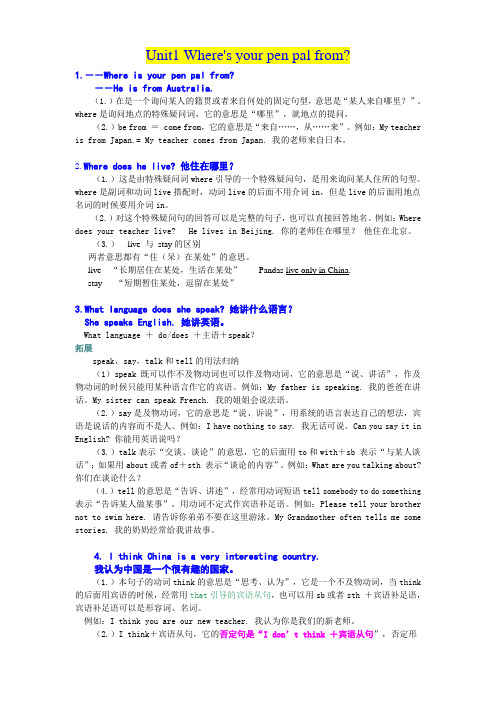
Unit1 Where's your pen pal from?1.――Where is your pen pal from?――He is from Australia.(1.)在是一个询问某人的籍贯或者来自何处的固定句型,意思是“某人来自哪里?”。
where是询问地点的特殊疑问词,它的意思是“哪里”,就地点的提问,(2.)be from = come from,它的意思是“来自……,从……来”。
例如:My teacher is from Japan.= My teacher comes from Japan. 我的老师来自日本。
2.Where does he live? 他住在哪里?(1.)这是由特殊疑问词where引导的一个特殊疑问句,是用来询问某人住所的句型。
where是副词和动词live搭配时,动词live的后面不用介词in,但是live的后面用地点名词的时候要用介词in。
(2.)对这个特殊疑问句的回答可以是完整的句子,也可以直接回答地名。
例如:Where does your teacher live? He lives in Beijing. 你的老师住在哪里?他住在北京。
(3.)live 与stay的区别两者意思都有“住(呆)在某处”的意思。
live “长期居住在某处,生活在某处”Pandas live only in China.stay “短期暂住某处,逗留在某处”3.What language does she speak? 她讲什么语言?She speaks English. 她讲英语。
What language + do/does +主语+speak?拓展speak,say,talk和tell的用法归纳(1)speak 既可以作不及物动词也可以作及物动词,它的意思是“说、讲话”,作及物动词的时候只能用某种语言作它的宾语。
例如:My father is speaking. 我的爸爸在讲话。
【节节高】七年级英语下册 单元知识点解析 牛津版
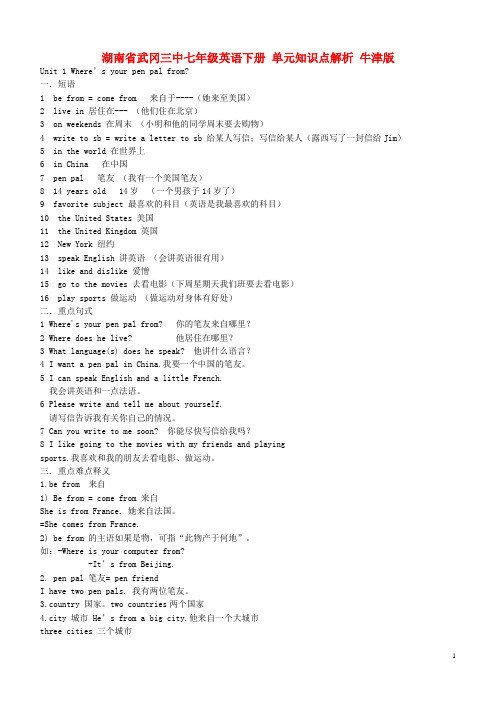
湖南省武冈三中七年级英语下册单元知识点解析牛津版Unit 1 Where’s your pen pal from?一.短语1 be from = come from 来自于----(她来至美国)2 live in 居住在--- (他们住在北京)3 on weekends 在周末(小明和他的同学周末要去购物)4 write to sb = write a letter to sb 给某人写信;写信给某人(露西写了一封信给Jim)5 in the world 在世界上6 in China 在中国7 pen pal 笔友(我有一个美国笔友)8 14 years old 14岁(一个男孩子14岁了)9 favorite subject 最喜欢的科目(英语是我最喜欢的科目)10 the United States 美国11 the United Kingdom 英国12 New York 纽约13 speak English 讲英语(会讲英语很有用)14 like and dislike 爱憎15 go to the movies 去看电影(下周星期天我们班要去看电影)16 play sports 做运动(做运动对身体有好处)二.重点句式1 Where's your pen pal from? 你的笔友来自哪里?2 Where does he live? 他居住在哪里?3 What language(s) does he speak? 他讲什么语言?4 I want a pen pal in China.我要一个中国的笔友。
5 I can speak English and a little French.我会讲英语和一点法语。
6 Please write and tell me about yourself.请写信告诉我有关你自己的情况。
7 Can you write to me soon? 你能尽快写信给我吗?8 I like going to the movies with my friends and playingsports.我喜欢和我的朋友去看电影、做运动。
Unit 1 Where is your pen pal from
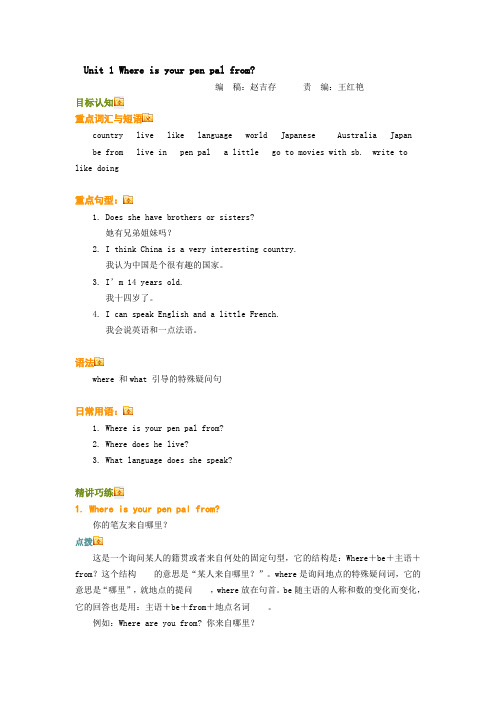
Unit 1 Where is your pen pal from?编稿:赵吉存责编:王红艳目标认知重点词汇与短语country live like language world Japanese Australia Japan be from live in pen pal a little go to movies with sb. write to like doing重点句型:1. Does she have brothers or sisters?她有兄弟姐妹吗?2. I think China is a very interesting country.我认为中国是个很有趣的国家。
3. I’m 14 years old.我十四岁了。
4. I can speak English and a little French.我会说英语和一点法语。
语法where 和what 引导的特殊疑问句日常用语:1. Where is your pen pal from?2. Where does he live?3. What language does she speak?精讲巧练1. Where is your pen pal from?你的笔友来自哪里?点拨这是一个询问某人的籍贯或者来自何处的固定句型,它的结构是:Where+be+主语+from?这个结构的意思是“某人来自哪里?”。
where是询问地点的特殊疑问词,它的意思是“哪里”,就地点的提问,where放在句首。
be随主语的人称和数的变化而变化,它的回答也是用:主语+be+from+地点名词。
例如:Where are you from? 你来自哪里?I am from Shandong. 我来自山东。
注意:be from = come from,它的意思是“来自......,从......来”。
例如:My teacher is from Japan.= My teacher comes from Japan.我的老师来自日本。
七年级英语新目标下重点短语句子翻译
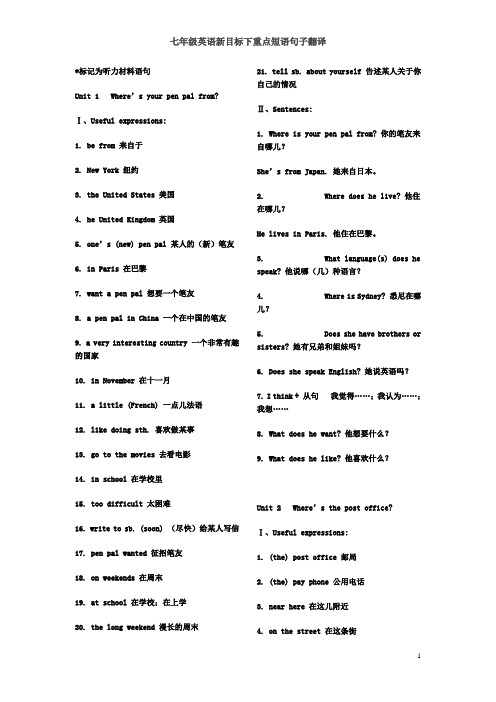
*标记为听力材料语句Unit 1 Where’s your pen pal from?Ⅰ、Useful expressions:1. be from 来自于2. New York 纽约3. the United States 美国4. he United Kingdom 英国5. one’s (new) pen pal 某人的(新)笔友6. in Paris 在巴黎7. want a pen pal 想要一个笔友8. a pen pal in China 一个在中国的笔友9. a very interesting country 一个非常有趣的国家10. in November 在十一月11. a little (French) 一点儿法语12. like doing sth. 喜欢做某事13. go to the movies 去看电影14. in school 在学校里15. too difficult 太困难16. write to sb. (soon) (尽快)给某人写信17. pen pal wanted 征招笔友18. on weekends 在周末19. at school 在学校;在上学20. the long weekend 漫长的周末21. tell sb. about yourself 告述某人关于你自己的情况Ⅱ、Sentences:1. Where is your pen pal from? 你的笔友来自哪儿?She’s from Japan. 她来自日本。
2. Where does he live? 他住在哪儿?He lives in Paris. 他住在巴黎。
3. What language(s) does he speak? 他说哪(几)种语言?4. Where is Sydney? 悉尼在哪儿?5. Does she have brothers or sisters? 她有兄弟和姐妹吗?6. Does she speak English? 她说英语吗?7. I think + 从句我觉得……;我认为……;我想……8. What does he want? 他想要什么?9. What does he like? 他喜欢什么?Unit 2 Wher e’s the post office?Ⅰ、Useful expressions:1. (the) post office 邮局2. (the) pay phone 公用电话3. near here 在这儿附近4. on the street 在这条街5. on Center Street 在中心街6. be across from 在……对面7. be next to 在……旁边;贴近……8. be between … and … 在……和……之间9. be in front of 在……之前10. on Green Street 在格林街11. be behind 在……之后12. in the neighborhood 在附近13. go straight 直走14. turn left/right 坐/右转15. be down Bridge Street 沿着大桥街16. on the right 在右边17. a clean/dirty park 一个清洁的/肮脏的公园18. a quiet/busy street 一条宁静的/繁忙的街道19. a new hotel 一家新旅馆20. an old hotel 一家旧旅店21. welcome to sp. 欢迎到某地22. the garden district 花园小区23. on fifth Avenue 在第五大道24. enjoy the city’s quiet streets 喜欢/享受这城市静谧的街道25. take a walk 散步26. through the park 穿过公园27. on Center Avenue 在中心大道28. across from the park 在公园对面29. a small house with an interesting garden一栋有个引人注目的花园的小房子30. the beginning of ………的开始31. visit Bridge Street 游览大桥街32.have fun 玩得开心33. a good place to have fun 一个好玩的地方34. be hungry 饿了35. buy some food 买点食物36. be arriving 就要到达了37. next Sunday 下周六38. let me tell you sth. 让我告诉你某事39. the way to sp. 去某地的路40. take a taxi 乘出租车41. from the airport 来自机场42. pass a bank 经过一间银行43. on your right/left 在你的右/左侧44. go down … 沿着……去45. go through … 穿过……46. at New Park 在新公园47. have a good trip 旅途愉快48. around here 在这附近*49. a quiet street off Fifth Avenue 一条远离第五大道的静谧的街道*50. on the corner 在街角;在拐角处Ⅱ、Sentences:1. Is there a …? 有……吗?Yes, there is. /No, there isn’t. 是,有的。
七年级下册英语长江电子版

七年级下册英语长江电子版Unit1 Where ’s your pen pal from 你的笔友来自哪里一、单词pal n.好朋友伙伴、pen pal 笔友、Canada 加拿大、France 法国、Japan 日本、the United States 美国、Australia 澳洲澳大利亚、Singapore 新加坡、Paris 巴黎the United Kingdom 英国、country n. 国家、Sydney 悉尼、New York 纽约、Toronto 多伦多、Tokyo 东京、live v. 居住、language n.语言、Japanese n.日语日本人、world n. 世界、French n.法国人法语、like n.pl.爱好、dislike v. 讨厌不喜欢n.反感厌恶的对象二、短语1、be from come form :来自,从……来,是……人2、pen palpen friend:笔友3、live in Paris :住在巴黎4、speak English:讲英语5、speak a little French:说一点法语6、a little French :一些法语7、play sports:做体育运动8、like playing sports :喜欢做运动9、go to the movies:去看电影10、an action movie :一部动作片11、on weekends:在周末12、Excuse me:对不起,打扰13、get to:到达、抵达14、beginning of:在 ...开始的时候15、at the end of:在 ...结束的时候16、write to me soon:快点给我写信17、play sports:运动、锻炼18、speak a little French :讲一点法语19、like going to the movies with my friends:喜欢和我的朋友去看电影20、tell sb about...告诉某人关于 ...... tell sb. about yourself :告述某人关于你自己的情况21、an interesting country: 一个有趣的国家22、in November:在十一月23、her favorite language:她最喜欢的语言24、write 学习必备欢迎下载to sbwrite a letter to sb 给某人写信write to Tom :写信给汤姆25、Julie ’s pen pal :朱利的笔友26、likes and dislikes: 好恶、爱憎27、thelong weekend: 漫长的周末28、at school 在学校;在上学29、too difficult :太困难30、a very interesting country :一个非常有趣的国家国家国籍国人语言中国China 中国的Chinese 中国人Chinese 汉语Chinese 英国the United Kingdom 英国的English 英国人Englishman 英语English 日本Japan 日本的Japanese 日本人Japanese 日语Japanese加拿大Canada 加拿大的Canadian 加拿大人Canadian 英语、法语EnglishFrench 美国the United States 美国的American 美国人American 英语English 法国France 法国的French 法国人Frenchman 法语French 澳大利亚Australia 澳大利亚的Australian 澳大利亚人Australian 英语English 三、重点句型:(1)Where is your pen pal from He ’s from China. 你的笔友来自哪里他来自中国。
unit1-where-is-your-penpal-from?period-3--新目标
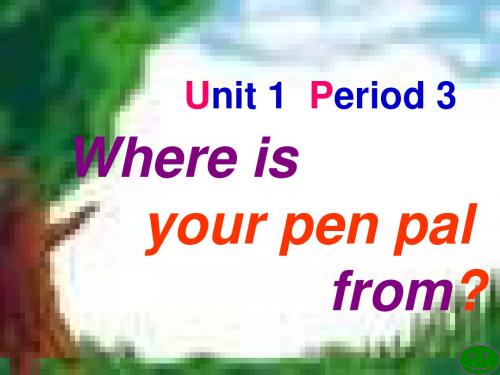
4. Where is your pen pal from ?
= Where does your pen pal come from ?
1. Maria is from France.
Maria isn’t from France . Is Maria from France ? Yes, she is . / No, she isn’t. Where is Maria from ?
1.There are lots of __c_o_u_n__t_ri_e_s___ in the world. 2.Beijing and Shanghai are big __c__it_i_e_s_____ .
3.Andrew comes from Australia .
He is an _A__u_s__tr_a_l_i_a_n________ . 4.__J_a_p__a_n_e__s_e____ are our good friends now. 5.The people in France speak __F_r_e_n_c__h_____ . 6.The capital of France is __P_a_r_i_s_______ . 7.Sam’s pen pal __l_iv_e__s_______ in Guangzhou.
3. What language does she speak ? She speaks English .
选择疑问句
一般疑问句 + or + 选择项 ?
变化规则:
1、把陈述句变为一般疑问句
2、在一般疑问句后加选择词 or 3、在选择词or后加选择项
人教版七年级英语下册各单元考点总结

They are kind of/very shy.他们有点儿害羞/非常害羞。
二、考点解析
1.Let’s do sth, let’s=let us 让我们做…… 人称代词用宾格 Let’s 之后跟动词原形。
What are you doing? 你在干什么 I am doing my homework. 我正在做我的家庭作业。
Where are you swimming? 你在哪里游泳 I am swimming at the pool. 我在水池里游泳。
Who is the boy talking to? 这个男孩在对谁说话 He is talking to his teacher.他在对他的老师谈话。
暖的/冷的/凉爽的。 2. How’s
it going? 近况如何 –Great./Not bad/pretty good/ Just so so/ terrible/Boring.很棒/不错/相当好/一般般
/糟糕/无聊的 3. Is Aunt Wang there? 王阿姨在那儿吗 –Yes,she is 是的她在。 /No,she isn’t.不,她不再。
What are you doing?你在干什么 I’m watching TV.我在看电视。
Do you want to go swimming?你想去钓鱼吗 Yes, I do. No, I don’t.
When do you want to go? 你什么时候想去 At three o’ clock.在三点钟。
3.give sb sth=give sth to sb 给某物给某人 4. get sth from sb 从某人出得到某物
安徽凤阳县凤阳二中七年级英语下册 第一单元 词汇和句型精讲 人教新目标版

Unit 1 Where’s your pen pal from?1.pal n.朋友,好友;(informal不正式,old-fashioned过时的)pen pal 笔友1)周末他想去见他的朋友。
He wants to meet his pals on weekends.2)你想找一个加拿大的笔友吗?Do you want a pen pal from Canada?2.单个国家名称前一般不加定冠词the,而合成的国家名称前需要加定冠词the。
China, Canada, America, Indiathe United States =the United States of America美利坚合众国the United Kingdom =the United Kingdom of Great Britain and Northern Ireland 大不列颠及北爱尔兰联合王国the People’s Republic of China 中华人民共和国3.live vi. 生活,居住1)大象活多长时间?How long do elephants live?2)你住在哪里?Where do you live?3)他的叔叔住在伦敦。
His uncle lives in London.4)她住在一个靠近河流的房子里。
She lives in the house near the river.live on sth. 以…为主食,主要吃…5)南方人主要吃米饭。
People in the south live on rice.live a …life=lead a …life 过着…的生活6)那一家人过着幸福的生活。
The family live / lead a happy life.make a living by doing 靠….谋生7)他靠修自行车谋生。
He makes a living by repairing bikes.live adj. (注意读音,常作定语)活的,有生命的8)那个市场上卖活鱼。
- 1、下载文档前请自行甄别文档内容的完整性,平台不提供额外的编辑、内容补充、找答案等附加服务。
- 2、"仅部分预览"的文档,不可在线预览部分如存在完整性等问题,可反馈申请退款(可完整预览的文档不适用该条件!)。
- 3、如文档侵犯您的权益,请联系客服反馈,我们会尽快为您处理(人工客服工作时间:9:00-18:30)。
Unit 1 Where is your pen pal from?Section A 1a—2d (第1课时)主备人:陈晨审核人:陈晨督办领导:“导学案”使用时间:2011.2 【学习目标】:1.Learn the countries and cities.2.Learn to how to ask and answer where the people live.【学习重难点】:1.Vocabularies: the words of the countries and the cities,pen pal,live (in)2.Sentences: Where is your pen pal from? He/She is from….Where does he /she live? He/She lives in….3.Students learn the new words of the countries and the citiesand learn how to ask and answer the people where they live.4.How to use the special questions with where.【学习方法】:自主, 展示, 合作探究【学习过程】:一、自主学习(教师寄语:Many hands make light work. )1.你知道这些国家和地区的英文名称吗?中国_______ 加拿大 ________ 法国 _______ 英国________澳大利亚_________ 美国 ________ 新加坡_________ 日本_______ 美国_______ 悉尼____________ 巴黎_________ 纽约___________ 多伦多___________ 东京______________2.回答下列问题(1)Where are you from?(2) Where is Jack from?=Where ___Jack ____ _____?二.展示交流(教师寄语:Many hands make light work. )Step 1创设情景,导入新课Students watch the map and then tell what countries they saw.Step 2 学练结合合作展示1c Practice the following conversation:---Do you have a pen pal? ---Yes, I do.---Where's your pen pal's from?----He/She is from .... (Write it down on the Bb)Step 3 Listening1. Finish 2a.2. Listen and circle. (2b)3. Listen and complete the chart. (2c)三、合作探究(教师寄语:Many hands make light work. )任务一Where is your pen pal from ?能说成 Where do your pen pal come from ?吗?任务二Where is/are + 主语 + from ?这一特殊疑问句用来询问某人来自哪里,回答时用主语+is/are +from+地点。
e g: Where are you from? I am from Huangshi.Where is he from? He is from Wuhan.拓展:be from = come from be是系动词 come 是实义动词eg: Where does he come from? He comes from Wuhan.2.live 不及物动词意思是“居住”不能直接加地点,需要有介词.eg: ----- Where does she live? ------She lives in Paris.3.pen pal =pen friend 笔友4.China 中国 Chinese 中国人 Japan 日本 Japanese 日本人Australia澳大利亚 Australian澳大利亚人eg: We are all Chinese. The three girs are Australians.四.【达标拓展】1. —Do you speak English or Chinese? —______ .A. Yes, EnglishB. No, ChineseC. ChineseD. Yes, I do2. —Where is London? —It’s in______.A. AustraliaB. EnglandC. AmericaD. France3. ______ you from England? A. Are B. Do C. Is D. Does4. They are in China now and they can speak______ Chinese.A. littleB. a littleC. manyD. any5. Mr. Black ______ in Toronto.A. liveB. livingC. to liveD. lives6. Mary is from France. She speaks______.A. FranceB. FrenchC. FrenchmanD. Franch7.She is from ______. A .Japan B. Japanese C. Chinese D. Japans8.I see three ________on the street.A. ChineseB. ChinaC. Chineses D . chinas9.Peter lives _______Singapore, but his sister lives _______ here.A. in;/B. in; inC. at; inD. /; in10. M ike often ___________(write) to his pen pal.11. Where does your uncle _____(live)? 12.It’s a map of _______(Chinese).13.Where ______your pen pal ______(come)from?14.I have five ____________(pen pal).They are all from Canada.15.Do you see the two _________( Australia) over there16.Bill’s pen pal is from America.(对划线提问) _____ ___Bill’s pen pal from?17.John isn’t from Australia.(同义改写) John ______ _______from Australia.18.The girl has pen pals.(变否定句)The girl ________ ________ pen pals.19.Jack lives in New York.(变一般疑问句)_______Jack__________ in New York.20.你的英语老师来自哪里? ______ ________ your English teacher________?或者______ ________ your English teacher________ _________?21.你阿姨住在伦敦吗?________your aunt _________ _______ London?22.他来自加拿大。
他住在多伦多。
He______ ______Canada. He _______ _______Toronto.五.【教学评价】通过本节课的学习我最大的收获是感到自己有待加强的是六.【教学(后)反思】Unit 1 Where’s your pen pal from ?Section A (3a-4) (第2课时)主备人:陈晨审核人:陈晨督办领导:“导学案”使用时间:2011.2 【学习目标】:1.熟练掌握本课时的单词和部分短语.2.熟练运用句型询问你的朋友来自那里并且居住在哪里。
3.熟练运用句型:Where are you from?=Where do you come from?【学习重难点】:熟练运用句型询问你的朋友来自那里并且居住在哪里。
【学习方法】:自主, 展示, 合作探究【学习过程】:一、自主学习(教师寄语:Many hands make light work. )(一)根据句意及首字母拼写单词。
(1)Where is his pen p from?(2)People in Japan speak J .(3)They are from china. They speak C .(4)Where is Sydney(悉尼)? In A .(5)Where are your parents from? They’re from S .(二)汉译英(1)你的父母来自哪里?Where________your parents____ ?(2)他们来自美国 They_________ ___________the United States。
(3)你的笔友来自哪里?Where ________your pen pal __________?(4)她来自日本. She _________ ___________ Japan.(5)Tom 的叔叔来自哪里? is uncle from?二.展示交流(教师寄语:Many hands make light work. )学习任务一: 读写、记忆本课单词和短语.1.个人自读,记忆.3.小组互相检查读、写情况.4.根据汉语写出下列英语单词并展示..国家纽约悉尼巴黎多伦多东京居住语言学习任务二: 练习描述一天的时间1. 练习下列对话Where is your pen pal from? He’s from Australia.Where’s John’s pen pal from? He’s from Japan.Where does he live? He lives in Paris.2. 两人一组练习对话3. 交流展示学习任务三: 1.完成2a.Where are these cities?Complete the chart.2.听力练习3.Pairwork.三、合作探究(教师寄语:Many hands make light work. )任务1.理解下面的2个句子区别:What languages do they speak?与What language does she speak?任务2.总结你在本节课中所学的句型四、达标拓展(教师寄语:Never do things by halves)(一)根据汉语意思完成句子。
